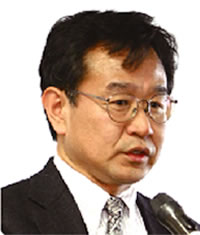Home > About Us > Sustainability Management > Sustainability Report > Sustainability Report 2014 > Third-Party Comment
 Third-Party Comment
Third-Party Comment
 COMMENT
COMMENT
<Third-Party Comment>
Comments on Reading the Kobe Steel Group's Sustainability Report 2014

Professor Shinichi Sakai
Director of the Environment
Preservation Research Center,
Agency for Health,
Safety and Environment,
Kyoto University
PROFILE
Shinichi Sakai
Shinichi Sakai acquired his doctorate from the Kyoto University Graduate School of Engineering in 1984. He worked as an assistant and associate professor at Kyoto University before becoming Director of the Center for Material Cycles and Waste Management Research, National Institute for Environmental Studies, Japan in 2001. In 2005 he became a professor at Kyoto University. In 2010 he was appointed director of the university's Environment Preservation Research Center and in 2011, after department restructuring, he assumed his current role. He was formerly chairman of the Japan Society of Material Cycles and Waste Management. He is also a special advisor to the Central Environment Council's Subcommittee on Waste Management and Recycling in the Ministry of the Environment, Japan. His publications include Waste and Chemical Substances (Iwanami Shoten Publishers).
Ever since the Great East Japan Earthquake of March 2011, Japanese society has had to face serious issues in regard to energy supply and demand and disaster prevention. In the "KOBELCO in Everyday Life" special features section found at the beginning of their Sustainability Report 2014, under headings such as "Energy Creation at KOBELCO" and "Protecting Against Disaster with KOBELCO," the Kobe Steel Group clarifies areas where industry and society intersect. Already engaged in independent power production on the scale of 1.4 million kW in the Kobe area, the Group has recently announced its intention to pursue 1.2 million kW-scale gas power generation in Tochigi. I would like to applaud the Group for developing businesses such as these, as they bear great significance for society. The report also covered power generation from biogas at Abeno Harukas. I look forward to seeing balanced business development targets that recognize the importance of renewable energy becoming a clear part of our horizon. The "Lightweight Vehicles with KOBELCO" section explained how materials contribute indirectly to improved fuel efficiency and lower CO2 emissions and, together with the information on the Group's Aluminum Value Chain activities, was very persuasive. Consequently, however, regarding the claim that CO2 emissions were reduced by 43.5 million tons, it would be preferable if a clear explanation of the basis for this claim was also disclosed.
This year's report was compiled according to three editorial themes: "implementing thorough compliance," "contributing to the environment through business operations" and "connecting with stakeholders." Regarding compliance, in addition to Kobe Steel's corporate mission for profitability, the report explained in detail the ways in which rules and regulations touch on the Group's activities. Combined now with environmental reporting, CSR reporting is undergoing a change in direction, but that change has the potential to tie up with the concept of "Creating Shared Value" (CSV). In other words, we are beginning to see a sophisticated level of development where corporations are pursuing business that is highly significant to society, creating shared value for both the company and the public. This year's "KOBELCO in Everyday Life" section introduced many items that contribute to sustainability for global society, and I think we can look forward to it developing into CSV data and analyses. In other words, I look forward to policies and provisions for contributing to public sustainability that also take into account boundaries and time scales. In the Kobe Steel Group's case, it seems that corporate and public sustainability will become increasingly interconnected issues, which is a highly auspicious development for all those whom the Group affects.
In closing, it was overall a positive sustainability report that showed clear signs of good performance. From this report, I infer that the company's success is due to the fact that environmental concerns are explicitly built into the company's management philosophies and practice. As a broad-ranging technological organization, I hope that the Kobe Steel Group will continue on the path it is on and mobilize its expertise throughout many aspects of society.


